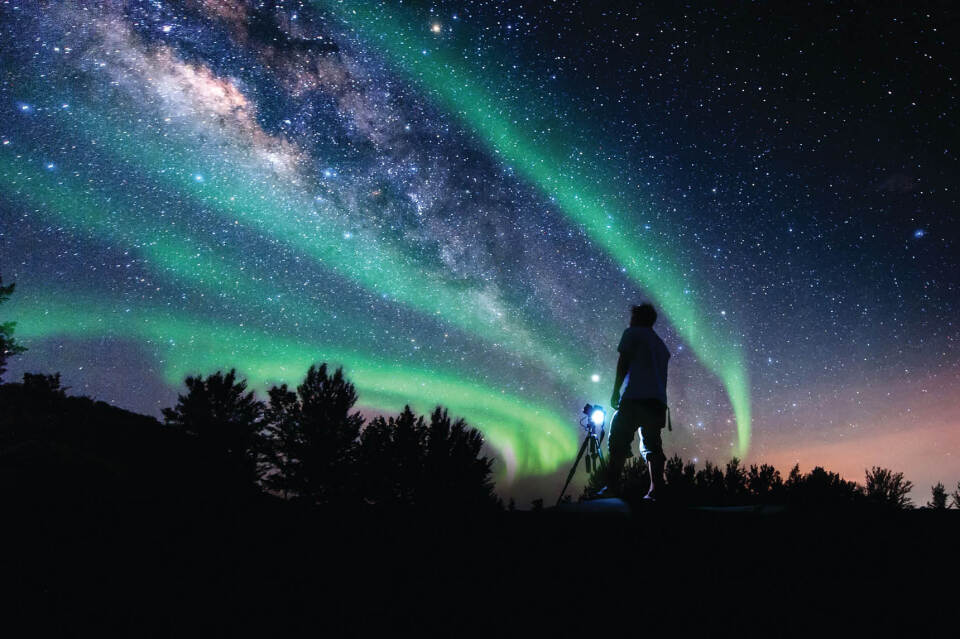
Step away from the books and pick up new skills with experiential learning
Driving down a rural gravel road in the northern U.S. following a huge storm with a bunch of her classmates was about as far away from the classroom as Shayla Trippier could get.
But by tracking and chasing severe weather, she was learning valuable skills for her future career.
Trippier, a recent grad, enrolled in Severe Thunderstorms – Storm Chasing and Field Techniques (GEOG 4670) while completing her Bachelor of Science and Physical Geography honours degree.
The course is a type of experiential learning students can include with their degree. Experiential learning allows you to gain practical, interactive experience related to your interests that can help you achieve your career goals.
For Trippier, who was interested working with Environment and Climate Change Canada or pursuing graduate studies, it was an opportunity to learn a forecasting tool called Millers analysis and apply it in real life.
“We are looking at layers of the atmosphere, different pressure levels and identifying in each layer and what’s important. Then we combine it all into one map and it points to where a severe storm would be most likely,” explains Trippier.
“At the end of the course, we went on a weeklong storm chasing trip. Every morning, we did our Millers analysis and did a morning briefing of where we thought severe weather would be. On our last day, we saw seven tornadoes in one huge storm. We could actually feel the air from behind us going into the storm and feeding it so it could get stronger. We could see the mesocyclones – the middle of the storm – rotating in real time which was a really exciting moment for all of us.”
For Javyn Desbois, experiential learning was a chance to try skills that gave her a better understanding of her desired career.
She was taking a general science degree in statistics and biology with the goal of becoming a math teacher. She signed up for Principles of Data Collection (STAT 2300) which allowed her to learn by doing what it is like to design an experiment, collect the data and analyze it using statistical software.
“It was a cool experience to design an experiment yourself, then go and conduct the experiment,” she explained. “I chose to compare the strength of material of Tuf-Tex balloons and Party Stuff balloons. I collected and then analyzed data in RStudio using a two-sample independence test.”
“I learned about what it would be like to conduct research in the field of Statistics and realized how interesting and meaningful it can be. I love math, but getting to do math on data you collected is pretty cool and something I would be interested in doing more of in the future.”
Where can I find these experiences at UM?
Trippier and Desbois participated in categories of experience learning called Applied Research and Project-Based Experiences.
Applied research can be independent, student lead research supported with faculty guidance, such as a thesis project, or it can be in collaboration with community partners and faculty researchers. In this experiential learning opportunity, students can conduct their own academic research. A project-based experience is an application of critical analysis and knowledge in your discipline to demonstrate learning or to address a problem.
To find these experiential learning opportunities:
- Explore the Experience Catalogue.
- Browse available courses for your degree program in the Academic Calendar.
- Find UM clubs relevant to your interests in the UMSU Clubs Directory
- Information about Hackathons and other computer science related projects can be found on the Faculty of Science page, the University of Manitoba Crew for Software Engineering Conferences, and the University of Manitoba’s Software Development Club.
Looking for some ideas to get started?
Honours theses and thesis projects are great ways for undergraduate students to create and conduct their own larger research project that fits with your interests and goals.
Courses involving case studies and simulations can incorporate mock trials and debates, allow you to engage with case studies, and create other simulated situations to replicate professional settings. Check out Introduction to Advocacy (LAW 2650), The Art of Scientific Visualization (SCI 4100), Fundamentals of Marketing (MKT 2210), Strategic Analysis (MGMT 0400), and Indigenous Women and the Camera (WOMN 3120).
The UM Faculty of Science alongside UMCrewSEC, and the UM devClub are great places to find non-course related hackathons and other projects in the computer science field.
Applied Research and Project-Based experiences can look different from one department to another. Be sure to consult your degree program requirements and talk to your department about how these courses and opportunities are delivered in your area of study.
To learn more about experiential learning and how it could impact your degree, visit the Experiential Learning Opportunities for Students page.






